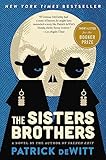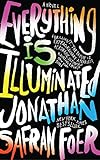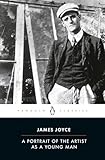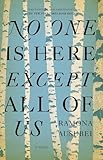When author Pauls Toutonghi set out to write his first book, he made himself a promise: he would not be another stereotype of “the debut novelist writing about his life.” So Toutonghi penned a “really terrible” World War Two novel followed by a cringe-worthy attempt at experimental fiction—a choose-your-own-adventure rip off. He never wrote in the first person, lest readers assume he was writing about himself. He didn’t sell either book; his career—or lack thereof—was a disaster.

 Eventually, Toutonghi gave up on his rigid strategy of avoidance and did what any smart writer does: he let the story and characters lead him, instead of the other way around. Toutonghi is half Latvian, half Egyptian and was raised in the U.S. He sold Red Weather, a coming-of-age story about a 15-year-old Latvian-American boy, followed by Evel Knievel Days, about a young Egyptian-American man in search of his father. Toutonghi wrote both books in the first person. And yet, he considers this less than a complete success: “I was reading Dickens,” he wrote in a recent essay for Salon, “who kept himself away from the page…and I can’t help wondering if anything is lost in the frank disclosures of our modern, first-person, memoir-driven fiction.”
Eventually, Toutonghi gave up on his rigid strategy of avoidance and did what any smart writer does: he let the story and characters lead him, instead of the other way around. Toutonghi is half Latvian, half Egyptian and was raised in the U.S. He sold Red Weather, a coming-of-age story about a 15-year-old Latvian-American boy, followed by Evel Knievel Days, about a young Egyptian-American man in search of his father. Toutonghi wrote both books in the first person. And yet, he considers this less than a complete success: “I was reading Dickens,” he wrote in a recent essay for Salon, “who kept himself away from the page…and I can’t help wondering if anything is lost in the frank disclosures of our modern, first-person, memoir-driven fiction.”
This is perhaps the greatest hang-up of the modern novelist—that fiction is somehow unsophisticated or inherently cliché if it is rooted in the writer’s own life, and that writers should be creative enough to invent entirely new worlds and find drama only in the unfamiliar. None of that is true, of course: Bookstores are full of beautiful novels like Toutonghi’s, and reviewers often celebrate autobiographical debuts. And yet this fear of self-reliance can be limiting, almost crippling.
 But if you talk to writers who have taken the autobiographical plunge, you’ll hear an almost universal relief—that writing about yourself allows you to follow your best instincts. Patrick DeWitt, author of The Sisters Brothers, spent a long time writing books that even his wife was unimpressed by. His problem, he decided: He was too afraid of seeming like “the white guy feeling sorry for himself.” But hey: in some way, that’s what he was. “I needed subject matter that was familiar to me if I wanted to go the distance.”
But if you talk to writers who have taken the autobiographical plunge, you’ll hear an almost universal relief—that writing about yourself allows you to follow your best instincts. Patrick DeWitt, author of The Sisters Brothers, spent a long time writing books that even his wife was unimpressed by. His problem, he decided: He was too afraid of seeming like “the white guy feeling sorry for himself.” But hey: in some way, that’s what he was. “I needed subject matter that was familiar to me if I wanted to go the distance.”
So where does this fear come from? Today’s literary criticism, for one. Laura Miller, who reviews books for Salon, is often turned off by coming-of-age debuts, particularly from writers who have just come of age themselves. She has some words for, say, white girls from Connecticut: “Your book could be really well written,” she says. But “you feel like you’ve read a million of them. It’s the story about this person growing up and learning to live and to love and whose parents get divorced and the mom dies of cancer. It feels like watching an episode of Law and Order—but that’s not really fair, because Law and Order is reliably entertaining.”
Even the New York Times can be dismissive like this. In 2005, when Deborah Solomon wrote about Jonathan Safran Foer, she praised him for avoiding “the usual rites of first-noveldom. He never wrote a tremblingly sensitive account of his adolescence, a novel featuring toxic mothers and passive, gone-to-sleep fathers, a novel abounding with malls and S.U.V.’s, and suburban anomie. Instead, he found his inspiration in the darkly fragmented masterworks of European modernism (Kafka, Joyce, Bruno Schulz)…”
 But do not be fooled: Everything Is Illuminated is a wonderful book, both highly innovative and emotionally powerful, but it is also a coming-of-age, semi-autobiographical story about a young white man coming to understand himself. Solomon would never belittle Foer’s book by writing in these exact terms, but when she speaks of “the usual rites of first-noveldom,” she’s not making a neutral statement. She’s making a derogatory one. She’s throwing all of these other books—and which books, by the way?—into the dustbin, castigating them all as navel-gazing and small-minded.
But do not be fooled: Everything Is Illuminated is a wonderful book, both highly innovative and emotionally powerful, but it is also a coming-of-age, semi-autobiographical story about a young white man coming to understand himself. Solomon would never belittle Foer’s book by writing in these exact terms, but when she speaks of “the usual rites of first-noveldom,” she’s not making a neutral statement. She’s making a derogatory one. She’s throwing all of these other books—and which books, by the way?—into the dustbin, castigating them all as navel-gazing and small-minded.
And you wonder what kept Toutonghi and DeWitt from writing about their own lives.
 Some writers were fortunate enough to begin writing before reading much literary criticism. “I felt free to take from personal experience,” says Justin Torres, author of the critically acclaimed and heavily autobiographical debut novel We The Animals. After the book, he says, he’d often meet writers who came out of MFA programs and seemed to believe he’s navel-gazing. “You’re mind-gazing,” he corrects. “You’re turning yourself outward, challenging your own assumptions and trying to make meaning out of life. I love Dickens, but thank god not everyone tries to write like him.” (In fact, Laura Miller cuts Torres a break here because We The Animals is based on Torres’s experience growing up gay and underprivileged in upstate New York. “To be crass,” she says, “his book was unusual in the type of people it was about. That was refreshing.”)
Some writers were fortunate enough to begin writing before reading much literary criticism. “I felt free to take from personal experience,” says Justin Torres, author of the critically acclaimed and heavily autobiographical debut novel We The Animals. After the book, he says, he’d often meet writers who came out of MFA programs and seemed to believe he’s navel-gazing. “You’re mind-gazing,” he corrects. “You’re turning yourself outward, challenging your own assumptions and trying to make meaning out of life. I love Dickens, but thank god not everyone tries to write like him.” (In fact, Laura Miller cuts Torres a break here because We The Animals is based on Torres’s experience growing up gay and underprivileged in upstate New York. “To be crass,” she says, “his book was unusual in the type of people it was about. That was refreshing.”)
When writers ask Torres, “Why write fiction if you want to write about yourself?”, he tells them there’s a magic in translating personal experience into make-believe: “The composites become characters, and the scraps of lived experience morph, so that what you end up with is wholly transformed.”
And the transformation is key. There are a finite number of experiences in the world and the trick is how to present them in a way that is both relatable and unique. It would be idiotic for a young author not to write a book based on her adolescence in Connecticut, if that’s what she’s compelled to write. And if her protagonist has a toxic mother or hangs out at the mall, it would be disingenuous not to include those details. But including them doesn’t necessarily mean you’re painting by numbers or writing a story that is narcissistic. “You just have to ask yourself, ‘What can I bring to literature by writing about this?’” Torres says. To him, authors who write outside their own experience have the exact same challenge as those writing close to the bone: how best to say something valuable. “There’s a lot of people writing formulaic gunslinger Cormac McCarthy fiction,” he says.

 The literary world didn’t always dismiss autobiography. A Tree Grows in Brooklyn by Betty Smith, A Portrait of the Artist As a Young Man by James Joyce, The Lover by Marguerite Duras, and The Sun Also Rises by Ernest Hemingway are all rooted in their authors’ lives. It’s impossible to trace this hang-up back to its origin, but Toutonghi has a suspicion of what triggered it: a resistance, especially prevalent in the MFA world, to the commoditization of fiction.
The literary world didn’t always dismiss autobiography. A Tree Grows in Brooklyn by Betty Smith, A Portrait of the Artist As a Young Man by James Joyce, The Lover by Marguerite Duras, and The Sun Also Rises by Ernest Hemingway are all rooted in their authors’ lives. It’s impossible to trace this hang-up back to its origin, but Toutonghi has a suspicion of what triggered it: a resistance, especially prevalent in the MFA world, to the commoditization of fiction.
Literature is an art, of course—though like in any art, there are those who hate to also think of it as a business. Writers who are overwhelmingly focused on craft and style might believe that writing the story of one’s young life is too crass, too obvious, and, god-forbid, too sellable. “Writers see that autobiographical work is more marketable, so many move in that direction,” Toutonghi says. And the purists do the opposite.
 Whether the market is really dictating authors’ subject matter is debatable, but it’s certainly true that right now mainstream publishing will unabashedly use an author’s back story to sell his or her book. Two recent debut novels that share similarities with Everything is Illuminated—The Tiger’s Wife by Tea Obreht and No One Here Except For All of Us by Ramona Ausubel—have been marketed with the author’s life as a selling point, as if biography is the ultimate “truth” of their stories.
Whether the market is really dictating authors’ subject matter is debatable, but it’s certainly true that right now mainstream publishing will unabashedly use an author’s back story to sell his or her book. Two recent debut novels that share similarities with Everything is Illuminated—The Tiger’s Wife by Tea Obreht and No One Here Except For All of Us by Ramona Ausubel—have been marketed with the author’s life as a selling point, as if biography is the ultimate “truth” of their stories.
That’s certainly news to emerging authors. “I didn’t realize my life would be the thing I’d be talking about in the interviews,” Torres said. Patrick DeWitt told me that most interviews about his novel Ablutions revolved around parsing the imaginary parts of the book from the real ones. “It became sort of a drag,” he said.
 But there’s an upside to this marketing hook, at least for me, as I shopped around my own debut: a semi-autobiographical, prep school novel called The Year of the Gadfly. Editors clearly saw the autobiographical material as a positive thing, and a potential way to market the book. Until then, I’d been so embarrassed about writing from my life that throughout my three-year MFA, I never told anybody where the story originated. I was just another white girl from Connecticut after all (well, actually, Washington DC, but same difference), writing about a young woman coming of age. I spent years feeling like a failure before I’d even started writing, all because I was terrified of producing a cliché. If only I could have written a World War II epic with a chose your own adventure twist.
But there’s an upside to this marketing hook, at least for me, as I shopped around my own debut: a semi-autobiographical, prep school novel called The Year of the Gadfly. Editors clearly saw the autobiographical material as a positive thing, and a potential way to market the book. Until then, I’d been so embarrassed about writing from my life that throughout my three-year MFA, I never told anybody where the story originated. I was just another white girl from Connecticut after all (well, actually, Washington DC, but same difference), writing about a young woman coming of age. I spent years feeling like a failure before I’d even started writing, all because I was terrified of producing a cliché. If only I could have written a World War II epic with a chose your own adventure twist.
But I never would have finished writing that sort of book. The Year of the Gadfly took me seven years from conception to publication. And my personal connection to the story was a key part of my stamina. It’s what fueled me to work so tirelessly in pursuit of truly unique characters and a compelling plot. My editor bought my book because the manuscript kept her reading all night. To her, to me, and hopefully to my readers, that’s all that really matters.
Image: Flickr/Strevs









